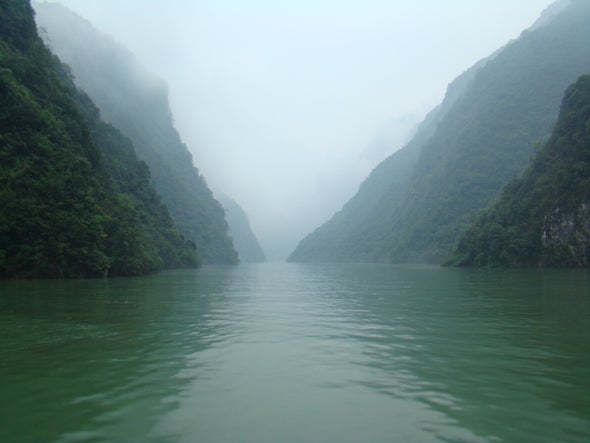(单词翻译:单击)
听力文本
This is Scientific American's 60-second Science, I'm Julia Rosen.
Gross domestic product, the GDP, is a simple way to describe the health of big, complicated economies. And for the last century, the goal of many countries has been to make their GDP go up. But concentrating only on GDP has had some downsides.
"In growing the economy, we have, as an unintended consequence, destroyed parts of nature, which are also important for our well-being."
Stephen Polasky, an environmental economist at the University of Minnesota. He and his colleagues have created a new measurement: the gross ecosystem product, or GEP.
"So that we actually have metrics that say how are we doing on ecosystems management, managing nature—and not just for nature's sake but 'How is that coming back and influencing our own well-being?' So really, GEP is trying to say, 'What is the contribution of nature to the economy?' So in a parallel way to what GDP does in measuring economic performance."
Tallying up the economic value of timber and fisheries is fairly straightforward. But other benefits of a healthy environment can be less obvious. Insects pollinate crops. Intact rivers improve water quality and buffer downstream cities from floods. Thriving ecosystems draw tourists, who spend money.

"And part of the issue here is that it is difficult to price some of these things. Some people even say, 'Well, they are priceless.' Unfortunately, what it means in practice—priceless means it has zero value in much of the calculations."
Zero value in the GDP but not in the GEP. For example, Polasky and his colleagues calculated the figure for Qinghai, a province in western China. They found that the gross ecosystem product exceeded GDP in the year 2000 and equaled three quarters of GDP in 2015. Over that period, GEP rose by 127 percent, thanks to major restoration efforts and the increasing value of water. The results are in the Proceedings of the National Academy of Science.
The researchers focused on Qinghai because it's one of several provinces where the Chinese government is experimenting with using GEP as part of its formal decision-making process. For instance, GEP can help officials weigh the pros and cons of potential projects like dams. Or it can be used to show whether local leaders are taking care of the environment and not just expanding the economy.
GEP could also serve as the basis for programs that pay residents to be good stewards of natural resources that benefit themselves and others. In Qinghai, such a program could work for water—the province is where the Yellow, Yangtze and Mekong rivers originate, and their waters sustain cities and farms across Asia.
Polasky says their work is just a first step, and he expects GEP to be refined over time. But he says we have to start somewhere.
"If we are actually going to have a sustainable civilization, then we have to pay attention to, kind of, the infrastructure, basically—the essential things that nature does for us—and not continue to just take them for granted."
Thanks for listening for Scientific American's 60-second Science. I'm Julia Rosen.
参考译文
这里是科学美国人——60秒科学系列,我是朱莉娅·罗森。
国内生产总值(简称GDP)是描述大型复杂经济体健康状况的简单方法。上个世纪,许多国家的目标一直是让本国的国内生产总值上升。但往往只关注国内生产总值有一些弊端。
“在发展经济的过程中,我们会无意中破坏一部分自然,而这些部分对我们的幸福同样重要。”
明尼苏达大学的环境经济学家斯蒂芬·波拉斯基说到。他和同事创造了一种新的衡量方法:生态系统生产总值(简称GEP)。
“这样一来,我们就有了指标,说明我们在生态系统管理和自然管理方面做得如何,不仅是为了保护自然,也是为了说明‘自然如何反过来影响我们的幸福?’因此,生态系统生产总值是尝试说明‘自然对经济的贡献是什么?’这与国内生产总值在衡量经济表现方面的作用不谋而合。”
统计木材和渔业的经济价值相当简单。但健康环境的其他益处可能并不那么明显。昆虫为农作物授粉。完整的河流改善水质,保护下游城市名遭洪水侵袭。欣欣向荣的生态系统吸引游客前来消费。
“存在问题的部分是,很难对其中一些东西定价。有些人甚至会说‘它们是无价的。’不幸的是,在实际中,无价意味着在大多计算中是零价值。”
在国内生产总值中为零,但在生态系统生产总值中并非如此。比如,波拉斯基和同事为中国西部省份青海进行了计算。他们发现,2000年该省的生态系统生产总值超过了国内生产总值,2015年时其生太系统生产总值相当于国内生产总值的四分之三。在此期间,由于大型生态工程和和水价值增加,生态系统生产总值上升了127%。研究结果发表在《美国国家科学院院刊》上。
研究人员关注青海省,因为中国政府在多个省份试验将生态系统生产总值作为正式决策过程的一部分,而青海省就是其中一个省份。例如,生态系统生产总值可以帮助地方领导者权衡水坝等潜在项目的利弊。或者它可以用来显示地方领导人是否在保护环境,而不仅仅是在发展经济。
生态系统生产总值还可以作为项目的基础,雇佣居民使其成为自然资源的好管家,造福自己和他人。在青海省,这种项目可以为水资源运作。青海省是黄河、长江和湄公河的发源地,其水资源供养着整个亚洲的城市和农场。
波拉斯基表示,他们的工作只是第一步,他希望生态系统生产总值能随着时间的推移不断完善。但他同时表示,我们必须从某个地方开始。
“如果我们想要有可持续的文明,那我们就必须关注基础设施,关注大自然为我们做的基本事情,而不是继续将其视为理所当然。”
谢谢大家收听科学美国人——60秒科学。我是朱莉娅·罗森。
译文为可可英语翻译,未经授权请勿转载!
重点讲解
重点讲解:
1. concentrate on 全神贯注;集中(心思);
It was up to him to concentrate on his studies and make something of himself.
是否能专心学习并取得一定成就要靠他自己。
2. for one's sake 看在…份上;为了帮助(某人);
For safety's sake, never stand directly behind a horse.
为安全起见,千万别站在马的正后方。
3. tally up 计算;合计;清点;
Bookkeepers haven't yet tallied up the total cost.
会计还没有计算出总成本。
4. take sth. for granted 认为…是理所当然的;
We are having to re-educate the public very quickly about something they have always taken for granted.
我们现在不得不尽快对公众进行再教育,因为他们一直都认为这是理所当然的。


